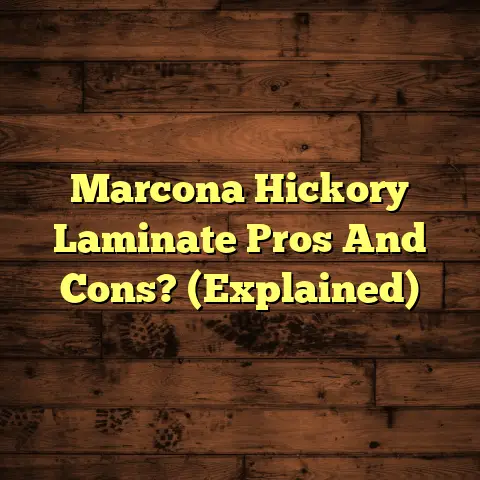Thickest Engineered Hardwood: Choose Wisely? (8mm?)
These days, everyone’s talking about engineered hardwood.
Why?
Because it’s beautiful, durable, and doesn’t break the bank like solid hardwood sometimes can.
But with so many options, how do you choose?
One question I get a lot is about thickness, specifically 8mm engineered hardwood.
Is it thick enough? Is it worth it? Let’s dive in and find out!
Understanding Engineered Hardwood
So, what exactly is engineered hardwood?
Think of it as solid hardwood’s smarter cousin.
It looks like real wood, but it’s constructed differently.
Solid Hardwood vs. Engineered Hardwood
Solid hardwood is, well, a solid piece of wood from a tree.
It’s gorgeous and can last for generations, but it’s also susceptible to moisture and temperature changes.
This can lead to warping, cupping, and other issues.
Engineered hardwood, on the other hand, is made of multiple layers.
The top layer is a veneer of real hardwood.
This is what you see and walk on, and it comes in various species and finishes.
Underneath that veneer are multiple layers of plywood or high-density fiberboard (HDF).
These layers are bonded together, creating a stable core that resists moisture and temperature fluctuations.
The Layer Cake: Anatomy of Engineered Hardwood
Wear Layer: This is the top layer, the real hardwood veneer.
Its thickness (measured in mils) determines how many times the floor can be sanded and refinished.Core Layer: This is the heart of the plank, providing stability and resistance to moisture.
Plywood cores are generally considered superior to HDF cores.-
Backing Layer: This bottom layer provides additional stability and helps prevent warping.
Manufacturing Magic
The manufacturing process plays a huge role in the quality of engineered hardwood.
High-quality planks are made with precision and care, using strong adhesives and durable materials.
This ensures that the layers don’t separate over time and that the floor can withstand daily wear and tear.
Why the Popularity Surge?
Engineered hardwood has exploded in popularity for a few key reasons:
- Stability: It’s less prone to warping and cupping than solid hardwood, making it suitable for basements and other moisture-prone areas.
- Cost: It’s generally more affordable than solid hardwood.
- Installation: It’s easier to install, often using click-lock systems that don’t require nails or glue.
- Variety: It comes in a wide range of species, finishes, and plank sizes.
The Importance of Thickness in Engineered Hardwood
Let’s talk thickness.
When it comes to engineered hardwood, thickness refers to the overall thickness of the plank, usually measured in millimeters (mm).
You’ll see options ranging from 8mm all the way up to 14mm or even thicker.
Decoding Thickness
Think of thickness as the floor’s backbone.
A thicker plank generally feels more solid underfoot and can better withstand wear and tear.
However, it’s not the only factor to consider.
The quality of the wear layer and the core construction are equally important.
The 8mm Question
8mm engineered hardwood is a popular choice, especially for budget-conscious homeowners.
It’s typically more affordable and easier to install than thicker options.
But is it the right choice for you? Let’s weigh the pros and cons.
Thickness and its Impact
Durability: Thicker planks tend to be more durable, especially in high-traffic areas.
They’re less likely to dent or scratch.-
Stability: A thicker core can provide better stability, resisting warping and cupping in humid environments.
-
Longevity: While the wear layer determines how many times a floor can be refinished, a thicker plank can generally last longer because it’s more resistant to damage.
8mm vs. The Competition
How does 8mm stack up against other common thicknesses?
Benefits of Choosing 8mm Engineered Hardwood
Okay, let’s talk about why you might choose 8mm engineered hardwood.
Budget-Friendly Flooring
Let’s face it, flooring can be expensive!
8mm options are generally more affordable than thicker planks, making them a great choice if you’re on a tight budget.
DIY Dream
Because they’re thinner, 8mm planks are often easier to install, especially if you’re doing it yourself.
The click-lock systems are usually simpler to work with, and the planks are lighter to handle.
Versatile Applications
8mm engineered hardwood can be a good option for certain environments:
-
Basements: If you’re installing over a concrete slab, the thinner profile can help minimize height differences with adjacent flooring.
-
Kitchens: With proper moisture protection, 8mm can work well in kitchens, especially if you’re concerned about raising the floor height too much.
-
Apartments: Many apartments have strict rules about flooring thickness, and 8mm often meets those requirements.
Sound Absorption
While thicker floors generally offer better sound absorption, 8mm engineered hardwood can still provide some level of noise reduction, especially when installed with a quality underlayment.
Aesthetic Appeal
Don’t think that 8mm means you have to sacrifice style!
You can find 8mm engineered hardwood in a wide range of species, colors, and finishes to match your décor.
Real-World Examples
Flipping a House: I recently worked on a house flip where the budget was tight.
We used 8mm engineered hardwood in the living room and bedrooms, and it looked fantastic!
It helped keep costs down without sacrificing the overall aesthetic.Condo Renovation: A client in a downtown condo wanted to update their flooring but had height restrictions.
8mm engineered hardwood was the perfect solution, providing a beautiful and durable floor that met the building’s requirements.
Drawbacks and Limitations of 8mm Thickness
Now for the not-so-fun part.
Let’s be honest about the potential downsides of choosing 8mm engineered hardwood.
Refinishing Restrictions
One of the biggest limitations is the refinishing potential.
Because the wear layer is thinner, you may not be able to sand and refinish the floor as many times as you could with a thicker option.
In some cases, you might not be able to refinish it at all.
Durability Dilemmas
In high-traffic areas like hallways and entryways, 8mm engineered hardwood may show wear and tear more quickly than thicker options.
It’s more susceptible to dents, scratches, and other damage.
Warranty Worries
Pay close attention to the warranty!
Some manufacturers offer shorter warranties on thinner engineered hardwood, or the warranty might not cover certain types of damage.
The Traffic Test
Think about how much foot traffic your floor will endure.
If you have kids, pets, or a busy household, you might want to consider a thicker option for added durability.
Real-World Concerns
Pet Problems: I’ve seen 8mm engineered hardwood scratched up pretty badly by large dogs with long nails.
A thicker floor with a tougher finish would have held up better.Moving Mishaps: I had a client who moved furniture into their new home, and they accidentally dropped a heavy dresser on their 8mm engineered hardwood floor.
It left a significant dent that couldn’t be repaired.
How to Choose the Right Engineered Hardwood for Your Home
Okay, so how do you decide if 8mm engineered hardwood is right for you?
Know Thyself (and Thy Home)
Start by evaluating your flooring needs:
-
Lifestyle: Do you have kids, pets, or a busy household?
-
Traffic Patterns: Which areas of your home get the most foot traffic?
-
Design Preferences: What style are you going for?
-
Budget: How much can you realistically spend on flooring?
Consult the Pros
Talk to a flooring professional!
I can’t stress this enough.
We can assess your specific needs and recommend the best flooring options for your home.
Do Your Homework
Don’t just take my word for it (or anyone else’s, for that matter).
Do your research!
Read online reviews, compare products, and ask questions.
Label Literacy
Learn to read the labels!
Pay attention to the wear layer thickness, core construction, and warranty information.
Warranty Wisdom
Understand the warranty before you buy.
What does it cover? How long does it last? What are the exclusions?
The Long Game
Think about the long-term.
How long do you plan to stay in your home?
Are you willing to invest in a more durable floor that will last for decades?
My Personal Experience
I once convinced a client to upgrade from 8mm to 12mm engineered hardwood, even though it was slightly over their budget.
A few years later, they thanked me profusely because their floor still looked brand new despite having two young children and a dog!
Conclusion
So, is 8mm engineered hardwood the right choice for you?
The answer, as always, is “it depends.”
Thickness is important, but it’s not the only factor to consider.
Think about your lifestyle, your budget, and your long-term goals.
Don’t be afraid to ask questions, do your research, and consult with a flooring professional.
The right flooring can transform your home and make it a more comfortable and beautiful place to live.
Choose wisely, and you’ll be enjoying your new floors for years to come!





